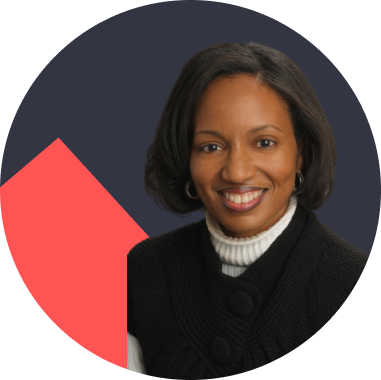Ongoing Self-Discovery with
Dr. Jada Bussey Jones

A Conversation with Dr. Jada Bussey Jones
“Compassion and empathy are really key and foundational for us healthcare providers. We have to be constantly thinking about what’s good for our patients, our community and health broadly speaking.”
Bio
Dr. Jada Bussey-Jones is the Chief of General Medicine and Geriatrics at Emory University, Professor of Medicine and Vice-Chair of Diversity Equity and Inclusion in the Department of Medicine, and the Director for Education for Emory’s Urban Health Initiative, where she has a strong interest in minority health and healthcare disparities. In addition to her local work, Dr. Jones is involved with several regional and national organizations, including serving as the chair of the National Disparities Education Task Force for the Society of General Internal Medicine. Her work has been recognized with several awards, including the American Business Women’s Association Award for Community Service, Emory’s Nanette Wenger Service Award, and the Society of General Medicine National Award for Mentorship in Education.
How would you define service learning and what is its role in medical education?
“I went to Emory Medical School long before I was on faculty and had a very different experience,” Dr. Jones began. “I think then, like now, Emory has always trained great clinicians that are prepared to diagnose and treat conditions in the clinical spaces. But what we’ve increasingly recognized as a society is that even when we get the diagnosis right, we have the appropriate treatment plan and make those recommendations for our patients, that when the patient walks outside of the doors of our office or our exam room in the hospital, they may not have the outcomes that we want for them or that they want for themselves.”
“And so increasingly Emory University, along with others, has realized the importance of getting our learners outside of the ivory tower. We’ve developed a required class that is integrated into all four years called Community Learning and Social Medicine. We partner our learners with various community-based organizations that are health related, but not clinical. All of the work that we’re asking them to do, they cannot wear a stethoscope. We’re not asking them to volunteer in a clinic. We’re asking them to think about health in this broader context to help problem solve.”
How important has mentorship been to you?
“I can say that mentorship for me has been incredibly important. I am a black woman, a descendant of slaves, a first-generation college student. My grandparents for example, were not able to attend high school because there were no high schools for black students at that time in their town. When I took my first job at Grady Hospital, I had not had mentorship.”
But it was there Dr. Jones came into contact with another black female doctor named Giselle Corbie-Smith, who is now at the University of North Carolina. “She tapped me on the shoulder, informed me that I needed a mentor, which I had no idea, and that changed the trajectory of my career.”
“She left within the first two years of me being on faculty and I was lost because there were certainly not other mentors who looked like me in my division, but really there were only about three professors or senior mentors at that time. We began to develop a peer mentoring program where there were a group of my colleagues and I formed a process where we could support each other.”
“What I know is that this process was successful. For women and for faculty of color, especially those who are underrepresented, turnover rates are incredibly high. So they’re less likely to stay in academia, less likely to get promoted to senior levels. What I know from our peer mentoring process and the response of having my own individual traditional mentor very early in my career is that our peer mentoring process was successful.”
Can you talk about some of the unique challenges that minority individuals face and how they can identify the right mentor for them?
“I think that there are content mentors that might align with where your career is going, what you’re working on and your research or your projects. I think that’s very clear. I think there are people that you can find that you share values with and can talk about the trajectory of your career and how that even potentially works within your goals for your family and your personal life. I think you can have a cadre of people that you may go to and should go to for different questions that come up when you’re making the big decisions about whether to take a job or how to solve a specific problem.”
“I think that knowing your own core values and having an idea of what your overarching goals are might help to drive some of those decisions about who you select as a mentor.”
How should mentees approach a mentorship relationship?
“When I’m the mentee the onus of the relationship is on me. If the person has identified themself and a willingness to be my mentor, first of all, I’m very explicit about that. You may have an initial conversation to find out if your interests are aligned, but you want to be frank and ask the person if they be interested and willing to be your mentor.”
“Also, as a mentee, I think it’s important to schedule the mentoring sessions. Your mentor, even if they are really invested in your career and what you’re doing, may have a lot of other things that they’re doing because they are by definition, often successful and quite busy. You want to start with the mentor to say, ‘What’s an acceptable time frame? Is every two months or every month acceptable? What would work for you?’ Once you agree to the terms of the mentoring relationship, the onus is on the mentee to make sure that they continue to engage and that you meet that schedule.”
“I also think that the mentee has a responsibility to define their own goals and objectives for the relationship, and to keep track of where they are from one time to the next. These are the things that I’m hoping to get out of the relationship, and then tracking how you’re doing on those things over time.”
Pearls of Wisdom
- Service learning is important. Your role as a physician is broader than just the clinical encounter.
- There is tremendous power in mentorship. Through being mentored by others, you are able to pursue a journey of continual self-discovery.
- Be proactive. Pursue mentors and seek to get on their schedule. Work to meet with them on a regular basis.
